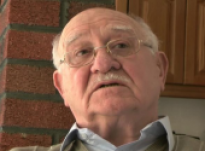Ken - Interview 40

More about me...
Ken was travelling home from Crete when he began to feel unwell. He decided to continue his journey home as he did not like the idea of being taken unwell so far from home. When he boarded the plane he found that he after sitting down he could not move his right arm up and down easily, and felt numbness in his leg. He realised that these could be the symptoms of a mild stroke, but was reluctant to ask for help for fear of being told he may not fly home. As he wasn’t totally incapacitated he managed to sleep for most of the flight home. He also managed to reclaim his baggage and catch the bus back to his home town where his son was due to collect him. His son noticed that his speech was slurred when they spoke on the phone, and when he arrived home his wife and daughter were concerned and contacted the hospital who told them to administer aspirin and take him straight to hospital. He was admitted to the stroke unit where it was confirmed that he had experienced a TIA or minor stroke. Ken found that his symptoms had all but disappeared during the five days he stayed in hospital. He was advised to refrain from driving for six weeks but following that was given the all clear to drive again.
Ken attributes the onset of the stroke to having had a particularly stressful day travelling to the airport in Crete, although the doctors did not confirm that as being the cause. Ken believes that as one gets older these things are bound to happen and he makes a point of keeping a positive attitude and accepting things. He tries to live a healthy lifestyle and has lost some weight since he had his minor stroke, however he has not made any major adjustments since having the stroke and believes that the best thing to do is to keep going and get on with life.
Ken who had fully recovered by the time he returned home feels it's important to keep going - 'it's a question of, you know, accept it and get on with it'.
Ken who had fully recovered by the time he returned home feels it's important to keep going - 'it's a question of, you know, accept it and get on with it'.
And who, so when you returned home was there somebody here to be with you or …?
Ken didn't want to be taken to hospital in another country so kept quiet about his symptoms.
Ken didn't want to be taken to hospital in another country so kept quiet about his symptoms.
Ken was told he had had a minor stroke and given a brief explanation of what that meant
Ken was told he had had a minor stroke and given a brief explanation of what that meant
Ken emphasises how important it is for health professionals to talk in simple language
Ken emphasises how important it is for health professionals to talk in simple language
Ken informed his insurance company about the TIA and stopped driving until his doctor said he could drive again
Ken informed his insurance company about the TIA and stopped driving until his doctor said he could drive again
Well after I, when I had the stroke, when I came out of hospital there was a period there was there when you know, went and saw the GP and he said, “Six weeks.” You know, “Don’t drive for six weeks and then come back.” So I did and he had a quick chat with me and says, “Well, I can’t see, you know…” took my blood pressure and that and he said, “Well I don’t see any reason why not.” You see, some, and this is purely for the insurance purposes.
Ken feels it's important to stay positive, not to worry about things and try and live a normal life again
Ken feels it's important to stay positive, not to worry about things and try and live a normal life again
I think it does change the way you feel about yourself because you, you, you tend to be a little bit more wary of what you’re doing, physically. There.
Ken takes several drugs now and has a general idea about what they're for
Ken takes several drugs now and has a general idea about what they're for

